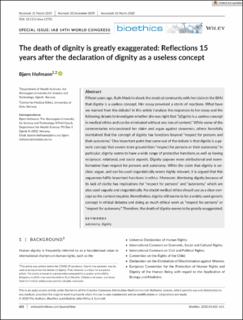| dc.contributor.author | Hofmann, Bjørn | |
| dc.date.accessioned | 2021-04-21T12:22:55Z | |
| dc.date.available | 2021-04-21T12:22:55Z | |
| dc.date.created | 2021-01-28T15:20:59Z | |
| dc.date.issued | 2020 | |
| dc.identifier.citation | Bioethics. 2020, 34 (6), 602-611. | en_US |
| dc.identifier.issn | 0269-9702 | |
| dc.identifier.uri | https://hdl.handle.net/11250/2738901 | |
| dc.description.abstract | Fifteen years ago, Ruth Macklin shook the medical community with her claim in the BMJ that dignity is a useless concept. Her essay provoked a storm of reactions. What have we learned from the debate? In this article I analyse the responses to her essay and the following debate to investigate whether she was right that “[d]ignity is a useless concept in medical ethics and can be eliminated without any loss of content.” While some of the commentaries misconstrued her claim and argue against strawmen, others forcefully maintained that the concept of dignity has functions beyond “respect for persons and their autonomy.” One important point that came out of the debate is that dignity is a generic concept that covers more ground than “respect for persons or their autonomy.” In particular, dignity seems to have a wide range of protective functions as well as having reciprocal, relational, and social aspects. Dignity appears more attributional and norm‐formative than respect for persons and autonomy. While the claim that dignity is unclear, vague, and can be used sloganistically seems highly relevant, it is argued that this vagueness fulfils important functions in ethics. Moreover, dismissing dignity because of its lack of clarity has implications for “respect for persons” and “autonomy,” which are also used vaguely and sloganistically. No doubt medical ethics should use as a clear concept as the context requires. Nonetheless, dignity still seems to be a widely used generic concept in ethical debates and doing as much ethical work as “respect for persons” or “respect for autonomy.” Therefore, the death of dignity seems to be greatly exaggerated. | en_US |
| dc.language.iso | eng | en_US |
| dc.publisher | John Wiley & Sons, Ltd. | en_US |
| dc.rights | Attribution-NonCommercial-NoDerivatives 4.0 Internasjonal | * |
| dc.rights.uri | http://creativecommons.org/licenses/by-nc-nd/4.0/deed.no | * |
| dc.title | The death of dignity is greatly exaggerated: Reflections 15 years after the declaration of dignity as a useless concept | en_US |
| dc.type | Peer reviewed | en_US |
| dc.type | Journal article | en_US |
| dc.description.version | publishedVersion | en_US |
| dc.source.pagenumber | 602-611 | en_US |
| dc.source.volume | 34 | en_US |
| dc.source.journal | Bioethics | en_US |
| dc.source.issue | 6 | en_US |
| dc.identifier.doi | 10.1111/bioe.12752 | |
| dc.identifier.cristin | 1881420 | |
| dc.description.localcode | This is an open access article under the terms of the Creative Commons Attribution-NonCommercial-NoDerivs License, which permits use and distribution in any medium, provided the original work is properly cited, the use is non-commercial and no modifications or adaptations are made. © 2020 The Authors. | en_US |
| cristin.ispublished | true | |
| cristin.fulltext | postprint | |
| cristin.qualitycode | 1 | |

